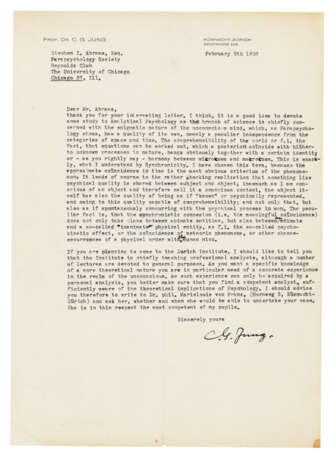ID 1249718
Lot 100 | Carl Jung (1875-1961)
Estimate value
£ 1 500 – 2 500
Typed letter signed (‘C.G. Jung’) to Stephen Abrams, [Küsnacht], 5 February 1958
In English. One page, 293 x 209mm, headed letter-paper, scattered ink corrections. Provenance: Stephen I Abrams (1938-2012); acquired privately, July 1980.
Jung recommends the study of analytical psychology and a session with his pupil, Marie-Louise von Franz. Describing analytical psychology ‘as that branch of science is chiefly concerned with the enigmatic nature of the unconscious mind, which, as Parapsychology shows, has a quality of its own, namely a peculiar independence from the categories of space and time. The comprehensibility of the world or f[or] i[nstance] the fact, that equations can be worked out, which a posteriori coincide with hitherto unknown processes in nature, hangs obviously together with a certain identity or – as you rightly say – harmony between microcosm and macrocosm. This is exactly what I understand by Sychronicity. I have chosen this term, because the approximate coincidence in time is the most obvious criterium of the phenomenon’, going on to explain in more detail how a psychical quality might be shared between a conscious subject and an object. He informs his correspondent that the Zurich Institute’s chief focus is the instruction of professional analysts, adding: ‘As you want a specific knowledge of a more theoretical nature you are in particular need of a concrete experience in the realm of the unconscious’. Such experience can only be acquired by personal analysis, he notes, recommending to that end that Abrams contact Marie-Louise von Franz [1915-1998], ‘in this respect the most competent of my pupils’.
Jung directs his letter to Stephen Abrams, recently graduated from J.B. Rhine’s programme at Duke, at a new address: the Parapsychology Society at the University of Chicago. His correspondence with the younger man on the topic of synchronicity began the previous year (see two preceding lots) and is notable for its expositional quality and the complexity of the ideas contained therein.
| Artist: | Carl Gustav Jung (1875 - 1961) |
|---|---|
| Place of origin: | Western Europe, Europe, Switzerland |
| Auction house category: | Letters, documents and manuscripts, Medicine & science, Books and manuscripts |
| Artist: | Carl Gustav Jung (1875 - 1961) |
|---|---|
| Place of origin: | Western Europe, Europe, Switzerland |
| Auction house category: | Letters, documents and manuscripts, Medicine & science, Books and manuscripts |
| Address of auction |
CHRISTIE'S 8 King Street, St. James's SW1Y 6QT London United Kingdom | |
|---|---|---|
| Preview |
| |
| Phone | +44 (0)20 7839 9060 | |
| Buyer Premium | see on Website | |
| Conditions of purchase | Conditions of purchase |











